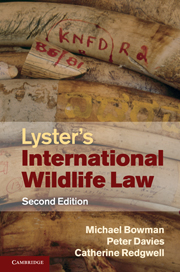Book contents
- Frontmatter
- Contents
- Foreword
- Preface
- List of abbreviations
- PART I Foundations of international wildlife law
- PART II Species regulation
- PART III Regional wildlife regulation
- PART IV Global wildlife regulation
- PART V Biological diversity: a new perspective on wildlife regulation
- PART VI Cross-sectoral issues in wildlife regulation
- PART VII Conclusion
- 22 Final reflections
- Index
- References
22 - Final reflections
Published online by Cambridge University Press: 05 July 2011
- Frontmatter
- Contents
- Foreword
- Preface
- List of abbreviations
- PART I Foundations of international wildlife law
- PART II Species regulation
- PART III Regional wildlife regulation
- PART IV Global wildlife regulation
- PART V Biological diversity: a new perspective on wildlife regulation
- PART VI Cross-sectoral issues in wildlife regulation
- PART VII Conclusion
- 22 Final reflections
- Index
- References
Summary
The analysis of international regulatory activity for the conservation, protection and management of nature and natural resources which has been presented above indicates that international wildlife law has come a very long way since its emergence in the latter stages of the nineteenth century. The intervening periods have witnessed an extraordinary proliferation of protective measures, frequently concluded in legally binding treaty form, and displaying ever greater indications of sophistication, adaptability and mutual coherence. In particular, this has been achieved through the incorporation of dedicated institutional arrangements which have sustained and enhanced the capacity of these treaties to clarify and advance their stated goals, and to work collaboratively to that end. The active participation of non-governmental actors – especially the scientific and technical communities and the various campaigning organisations and other representatives of civil society – has proved crucial in maximising the potential of these institutional arrangements. While the basic foundations for this elaborate edifice of twenty-first-century international wildlife law and institutions had already been laid by the publication of the original edition of this work in 1985, they have been both deepened and strengthened, and significantly built upon, in the interim. There is, accordingly, little serious risk of the modern generation of international conservation agreements ultimately sharing the fate suffered by so many of their forebears – namely gradual but inexorable consignment to that forlorn category of ‘sleeping treaties’, to utilise Simon Lyster's own evocative phrase.
- Type
- Chapter
- Information
- Lyster's International Wildlife Law , pp. 719 - 723Publisher: Cambridge University PressPrint publication year: 2010



